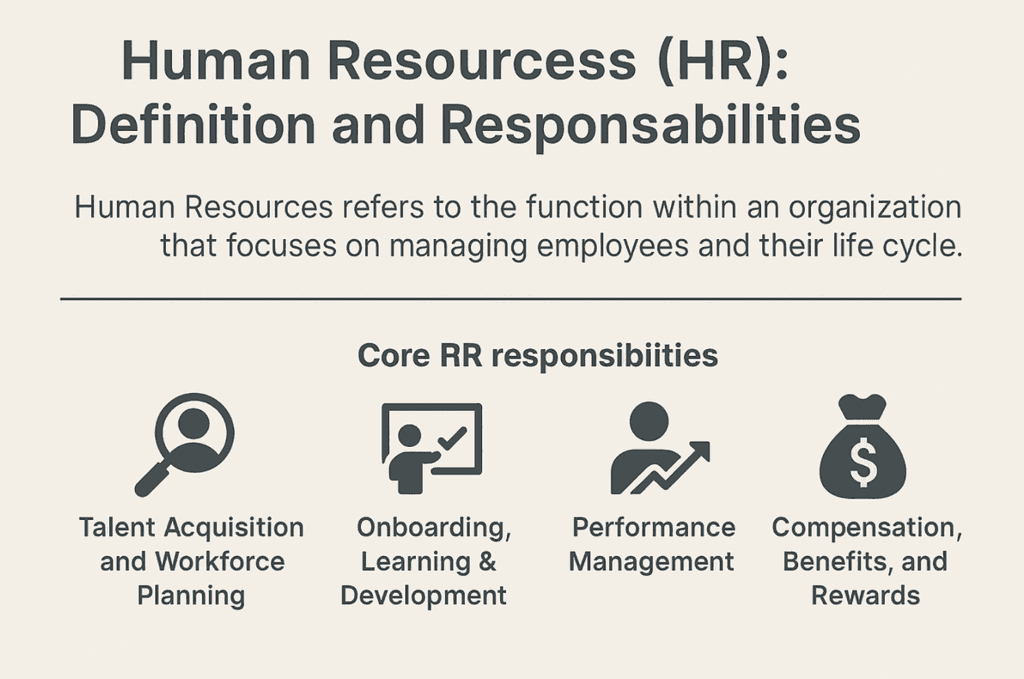Human Resources (HR) is far more than a department responsible for hiring and payroll. It is a critical function that influences organizational success by shaping workplace culture, managing talent, driving compliance, and enabling strategic growth.
This guide explores the definition of HR, its core responsibilities, and the strategic value it brings to modern organizations.
What is Human Resources?
Human Resources refers to the function within an organization that focuses on managing employees and their life cycle—from recruitment to retirement. It is responsible for aligning workforce capabilities with business goals, while ensuring legal compliance and cultivating a positive work environment.
As Wikipedia defines it, HR deals with all aspects of managing people within an organization. This includes policies, systems, recruitment, training, employee relations, performance management, and benefits administration.
Further, Indeed UK emphasizes that HR also plays a crucial role in shaping employee experiences, boosting morale, and fostering a collaborative work environment.

Core Responsibilities of Human Resources
Human Resources professionals are responsible for a range of interdependent functions. Below is a detailed breakdown of key responsibilities:
1. Talent Acquisition and Workforce Planning
Effective HR starts with acquiring the right people.
- Job Analysis & Planning: Identifies current and future staffing needs based on business strategy.
- Sourcing Candidates: Uses job boards, social media, recruitment agencies, and employee referrals.
- Interviewing & Selection: Coordinates structured interviews, assessments, and background checks.
- Employer Branding: Builds a compelling EVP (Employee Value Proposition) to attract top talent.
2. Onboarding, Learning & Development
Beyond recruitment, HR must equip employees for success.
- Onboarding Programs: Creates structured orientations to introduce company values, processes, and teams.
- Training & Upskilling: Facilitates technical, soft skills, leadership, and compliance training.
- Career Development: Supports mentorship, coaching, and succession planning initiatives.
3. Performance Management
HR ensures that individual performance aligns with organizational goals.
- Goal Setting: Implements SMART objectives at individual and team levels.
- Feedback Mechanisms: Enables 1:1s, check-ins, 360-degree feedback, and self-assessments.
- Performance Reviews: Coordinates biannual or continuous evaluation processes.
- Technology Support: Leverages digital tools and platforms to streamline performance reviews—explore more in the Ultimate Guide to HRIS Systems in 2026.
4. Compensation, Benefits, and Rewards
Rewarding employees competitively is essential for retention.
- Pay Structures: Designs salary bands and manages compensation benchmarking.
- Incentive Programs: Administers bonuses, equity plans, and non-monetary recognition.
- Benefits Management: Oversees pensions, healthcare, insurance, and wellbeing programs.
- Total Rewards Communication: Ensures transparency in reward policies and benefits education.
5. Employee Relations and Legal Compliance
HR protects both the organization and its employees.
- Employee Engagement: Implements surveys, focus groups, and feedback loops to track morale.
- Conflict Resolution: Mediates disputes and handles grievances with fairness and discretion.
- Policy Management: Maintains up-to-date handbooks, procedures, and disciplinary guidelines.
- Compliance: Ensures adherence to employment law, health and safety, and GDPR/data protection.
The Strategic Evolution of HR
Traditionally seen as administrative, HR is now recognized as a strategic partner to the C-suite. Today’s HR leaders contribute directly to:
- Organizational Development: Drives transformation initiatives and culture shifts.
- Diversity, Equity, and Inclusion (DEI): Builds inclusive practices and tracks representation metrics.
- Workforce Analytics: Uses data to inform decisions on turnover, hiring, and engagement.
- Change Management: Supports teams through mergers, restructures, or digital transformation.
Inspirational Insights for HR Leaders
Leadership in HR also means inspiring people to do their best work. Access a rich collection of HR motivational quotes and insights that reinforce the human side of human resources.
Conclusion
Human Resources is a multi-faceted discipline with both operational and strategic influence. From hiring to succession planning, and compliance to culture, HR professionals are central to enabling business performance through people.
In an era of hybrid work, rapid change, and digital transformation, the HR function is more vital than ever. Its success hinges on balancing empathy with analytics, policy with people-first thinking, and short-term needs with long-term vision.
